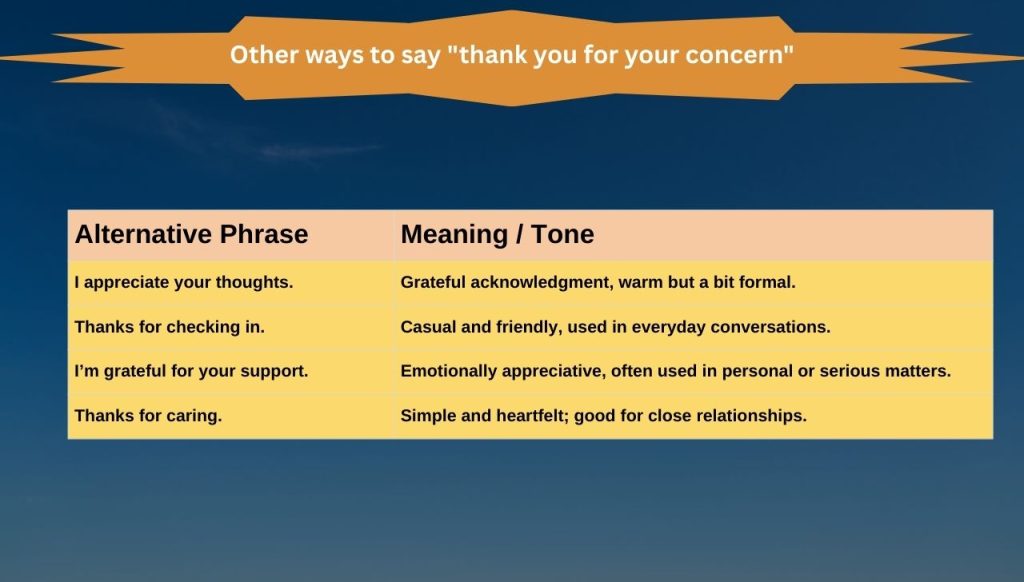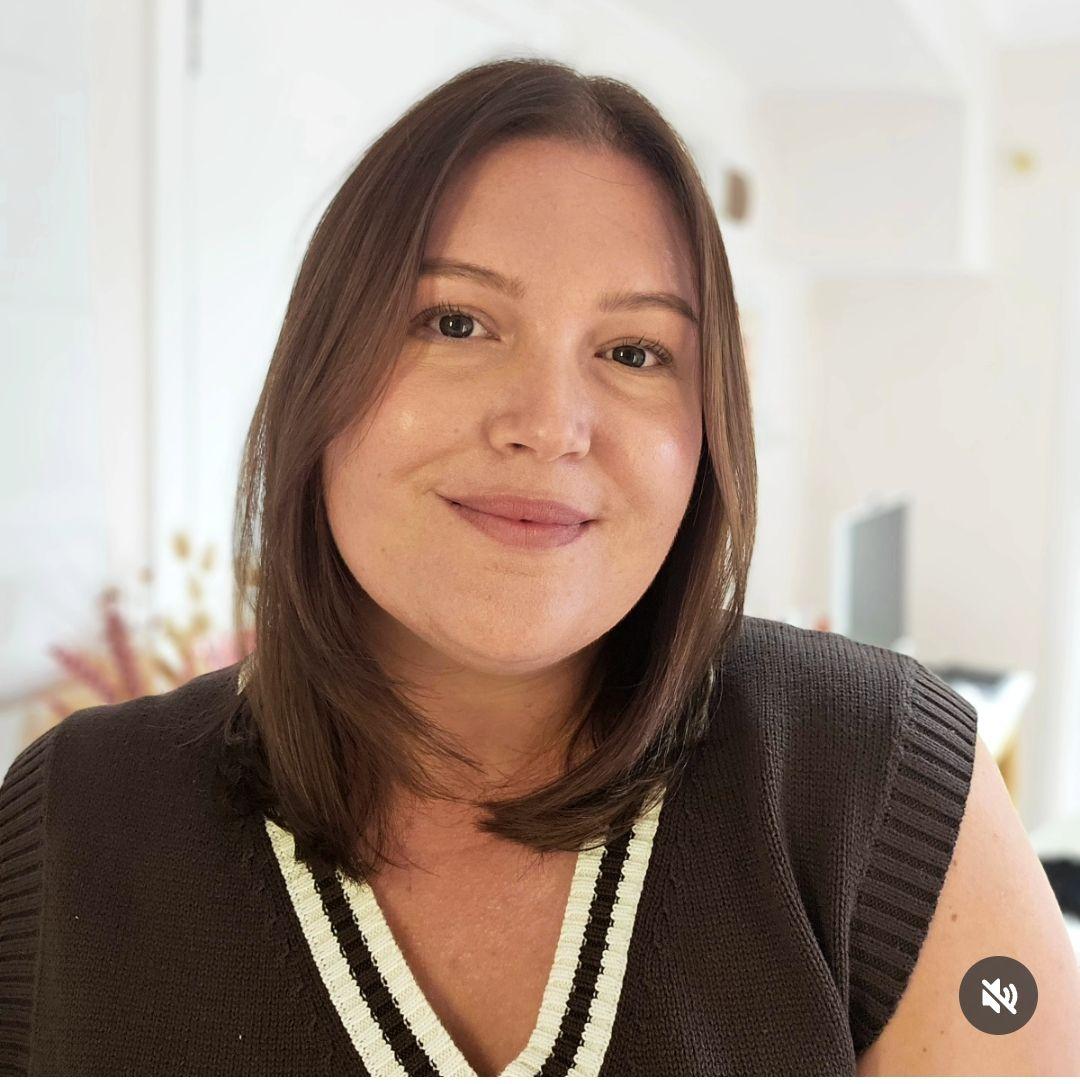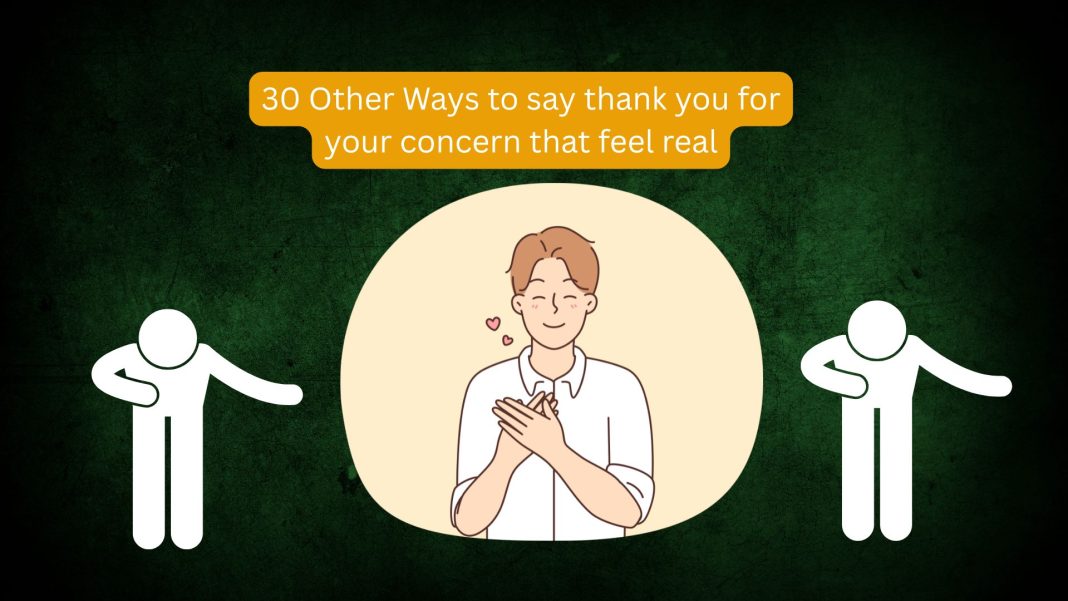“Thank you for your concern” is a kind and polite response—but sometimes, it feels a little too routine, right? Whether you’re replying to a colleague checking in, a friend showing support, or even a stranger offering help, switching things up can go a long way. Language is powerful, and with just a few thoughtful tweaks, you can make your appreciation feel warmer, more personal, and genuinely heartfelt. So why stick to the same old phrase when you can express gratitude in ways that sound more like you? Let’s explore some fresh, sincere alternatives to show you really care.
“Thank you for your concern” Meaning
“Thank you for your concern” is a polite way of acknowledging that someone has shown care, worry, or interest about your well-being or a situation you’re involved in.
Depending on the context, it can mean a few different things:
- Sincere Appreciation
- If someone checks in on you during a difficult time, like after an illness or a stressful event, saying “Thank you for your concern” is a genuine way to express gratitude for their kindness.
- “I heard you weren’t feeling well. Are you okay?”
- “Yes, I’m doing better now. Thank you for your concern.”
- Polite Dismissal
- Sometimes, it’s used to gently brush off unsolicited advice or emotional involvement—especially when you don’t want to go deeper into the conversation.
- “You really should reconsider your decision.”
- “Thank you for your concern, but I’ve decided.”
- Mildly Sarcastic or Icy
- In more formal or tense settings, it can carry a hint of passive-aggression or sarcasm—especially if tone and context suggest irritation.
- “I just think you’re making a mistake.”
- “Thank you for your concern.” (said coldly = Not thankful)
So, what’s the key?
Tone and context do all the heavy lifting here. If it’s spoken warmly, it’s probably sincere. If it’s clipped or overly formal, it might be polite to say, “Thanks, but no thanks.” Let me know if you’ve got a specific situation in mind—nuance depends on how and when it’s said.
When to use “thank you for your concern”
“Thank you for your concern” is one of those phrases that can land a little differently depending on how and why you use it. Let’s break it down.
✅ When it works well:
- Someone expresses genuine worry or care about your wellbeing
- Example: A coworker hears you were sick and checks in.
- ➤ “Thank you for your concern—I’m feeling much better now.”
- A polite response to someone offering help or advice (even if you don’t take it)
- Example: A friend warns you about potential risks in your decision.
- ➤ “I appreciate you looking out for me. Thank you for your concern.”
- Professional settings where you need to acknowledge empathy but stay neutral
- Example: A client apologizes for a challenging situation you’re facing.
- ➤ “Thank you for your concern. I’m managing things as best I can.”
⚠️ When it can sound… off:
- As a subtle brush-off (intentionally or not)
- If someone is very emotionally invested and you say it too flatly, it might feel cold.
- ➤ “Thank you for your concern” can be “Thanks, but I don’t want to talk about it.”
- When paired with a defensive or sarcastic tone
- ➤ “Thank you for your concern” + eye roll = classic passive-aggressive move.
💬 Alternatives depending on tone:
- Warm and appreciative:
- “That means a lot, thank you.”
- “I appreciate you checking in.”
- More formal or neutral:
- “Thanks for reaching out—I appreciate your thoughtfulness.”
- “I value your input, thank you.”
- Polite but distant (if you are brushing off a comment nicely):
- “I’ve handled it, but thank you for your concern.”
Why to say “thank you for your concern”
Saying “thank you for your concern” is a polite, often understated way to acknowledge that someone has shown care or worry about your well-being, situation, or feelings. It’s one of those social phrases that can carry different shades of meaning depending on context and tone. Here’s why and when you’d use it:
1. Acknowledging Empathy
At its core, it’s recognizing that someone took the time to care. If a friend notices you’re stressed and checks in, replying with “thank you for your concern” shows appreciation—without needing to spill all your emotions.
Example:
“You’ve seemed tired lately. Everything okay?”
“Yeah, I’ve just had a lot on my plate lately. Thanks for your concern—it means a lot.”
2. Polite Deflection
Sometimes, it’s used more diplomatically. Let’s say someone oversteps, or you’re not comfortable sharing details. This phrase gives you an out—it acknowledges their gesture without inviting further probing.
“I heard about your breakup—what happened?”
“Thanks for your concern, but I’d rather not talk about it now.”
3. Professional Courtesy
It’s a go-to phrase for handling difficult conversations tactfully in the workplace or formal situations, especially when dealing with clients, HR, or leadership. It keeps things civil while creating space.
“We noticed you’ve been out sick; is everything okay?”
“Yes, thank you for your concern. I’m on the mend and looking forward to returning to work.”

Other ways to say “thank you for your concern”
| Alternative Phrase | Meaning / Tone |
|---|---|
| I appreciate your thoughts. | Grateful acknowledgment, warm but a bit formal. |
| Thanks for checking in. | Casual and friendly, used in everyday conversations. |
| I’m grateful for your support. | Emotionally appreciative, often used in personal or serious matters. |
| Thanks for caring. | Simple and heartfelt; good for close relationships. |
| I really value your concern. | Formal but warm; acknowledges the person’s intention with sincerity. |
| That means a lot to me. | Emotionally open, personal. |
| Thank you for being so thoughtful. | Polite and kind, often used in more emotional or vulnerable situations. |
| I truly appreciate your kindness. | Very polite and a bit formal; often used in written communication. |
| Thank you for reaching out. | Neutral-professional tone; great for emails or messages. |
| I’m touched by your concern. | Emotional and heartfelt, appropriate in deeper conversations. |
| Thanks for thinking of me. | Casual and genuine; suitable for friendly situations. |
| I appreciate your checking on me. | Neutral and direct, works in professional or personal contexts. |
| I’m thankful for your care. | Warm and sincere, slightly formal. |
| Thank you for your thoughtfulness. | Polite and often used in written messages. |
| I’m lucky to have someone who cares. | Personal and endearing; best for close relationships. |
| Appreciate the support. | Casual and slightly clipped, common in texts or informal chats. |
| Thanks for the kind words. | Polite, often used in response to comforting or sympathetic messages. |
| That was kind of you to ask. | Polite and conversational. |
| I really appreciate your checking in. | Friendly tone, good for both casual and semi-formal interactions. |
| I’m grateful you thought of me. | Warm and slightly formal. |
| Thanks for being concerned. | Neutral but polite—sometimes used when trying to end a discussion gently. |
| I appreciate your empathy. | Slightly formal, good when someone offers emotional understanding. |
| Thanks for your thoughtfulness—it means a lot. | Warm, expressive; blends appreciation and emotional openness. |
| Thank you for your kind gesture. | Often used when someone did something thoughtful, not just said something. |
| I’m glad you care. | Friendly, sometimes slightly emotional. |
| Your concern is appreciated. | Formal and reserved; best for emails or professional settings. |
| That’s very kind of you. | Polite, soft, and commonly used in both personal and work settings. |
| I appreciate your message. | Suitable for written communication; short and respectful. |
| Thank you for your kind heart. | Very heartfelt—great for deeper emotional conversations. |
| It’s comforting to know you care. | Honest and intimate; good when expressing vulnerability. |
Conclusion
Gratitude isn’t one-size-fits-all—and neither are the words we use to express it. By finding the right phrases, you show people you see them, not just their actions. A well-placed “I truly appreciate that” or “It means a lot” can spark connection in ways a simple “thanks” might miss. So next time someone shows they care, take a moment to say it your way—with heart.

Grammar Nerd, ESL Trainer, Low-Key Comma Crusader
Daniel has taught English for over a decade, from small community classes in Oaxaca to bustling university halls in London. He has a knack for turning even the driest grammar points into relatable, real-life language tools—think fewer red pens, more real talk. He co-founded Grammation to make grammar less gatekeeper-y and more global. When he’s not decoding sentence structures, he’s probably hiking with a paperback novel or adding unnecessary hyphens for fun.
“The rules of grammar should empower people—not trip them up.”


